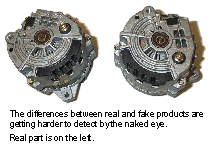Until the 1980s, counterfeiting was thought of as a victimless crime, conjuring up images of knock-off brand-name watches and handbags. Today, however, counterfeiting is big business, accounting for 5-8% of all goods sold worldwide.
In terms of criminal activity, counterfeiting is among the most lucrative crimes today, its impact on the global economy estimated at $350 billion to $500 billion a year. (In comparison, bank robberies account for less than $100 million per year globally.) The Federal Bureau of Investigation has called counterfeiting “the crime of the 21st century.”
 The differences between real and fake products are getting harder to detect, causing serious financial and physical harm. Some of today’s counterfeit products can easily escape detection by the naked eye with their look-a-like accuracy. Yet, while the appearance of counterfeit products has improved in some cases, they only approximate the original, with no regard for safety or quality standards.
The differences between real and fake products are getting harder to detect, causing serious financial and physical harm. Some of today’s counterfeit products can easily escape detection by the naked eye with their look-a-like accuracy. Yet, while the appearance of counterfeit products has improved in some cases, they only approximate the original, with no regard for safety or quality standards.
 Industry experts warn there is an increased possibility today that dangerous counterfeit products could appear unknowingly under the hood of the family car or on a fleet of trucks. According to CBS News, the auto industry has found enough different fake parts being sold in U.S. part stores to construct an entire car, with components such as brakes made of compressed grass and wood.
Industry experts warn there is an increased possibility today that dangerous counterfeit products could appear unknowingly under the hood of the family car or on a fleet of trucks. According to CBS News, the auto industry has found enough different fake parts being sold in U.S. part stores to construct an entire car, with components such as brakes made of compressed grass and wood.
According to Anthony Lupo, an attorney at law firm Arent Fox, any purchaser may be held liable for selling counterfeit products if he knew or had reason to know the products were counterfeit. Lupo defines a “purchaser” as a distributor, retailer, wholesaler or installer.
“Resellers may be held liable for counterfeiting if they had knowledge or had reason to know that the products were counterfeit,” Lupo said. “Knowledge can be demonstrated by several factors, including but not limited to, the quality, price and manner of distribution of the products and notification in the form of a cease and desist letter.”
Lupo added “knowledge” may be established through “willful blindness” where the reseller fails to inquire about the authenticity of the products for fear of what such an inquiry may yield. Once knowledge has been established, a reseller, such as a WD or jobber, may be held civilly and criminally liable for counterfeiting.
Civil damages can include special monetary damages, statutory monetary damages and non-monetary relief. Courts can also issue preliminary injunctions, permanent injunctions, temporary restraining orders and seizure orders, and may order the freezing of assets, the attachment of property and the destruction of counterfeit goods.
Criminal penalties depend on the whether the accused is an individual or a corporation. For example, individuals who knowingly use a counterfeit mark on or in connection with goods or services may be fined up to $2 million and/or imprisoned for up to 10 years for a first offense.
The Motor & Equipment Manufacturers Association (MEMA) saw an opportunity to educate the aftermarket and heavy-duty industries about this critical issue. MEMA formed the Brand Protection Council (BPC) in 2004 to help the association and its members address the issue and set priorities in the areas of counterfeiting, diversion, non-compliant products and intellectual property rights. The group has made impressive strides in its efforts to educate and communicate with the industry, media and government about the devastating impacts counterfeiting has in the automotive industry.
“This is certainly an issue that consumers should be aware of,” said Paul Foley, vice president of the Automotive Aftermarket Suppliers Association (AASA), MEMA’s aftermarket segment, which directs the BPC. “This has been a serious issue that has cost American manufacturers business and jobs both overseas and domestically, but now it is becoming a public safety issue.”
This month, MEMA and the BPC have produced a supplemental publication on counterfeiting. Being distributed with the February issue of select Babcox magazines including Underhood Service, the publication will serve as a resource guide for warehouse distributors, parts stores, retailers and technicians in the automotive aftermarket, as well as for parts distributors, fleet equipment and maintenance managers and service providers in the heavy-duty market. The full-color, 16-page supplement includes a comprehensive overview of the issue of counterfeiting, a glossary of terms, a list of crucial industry and government contacts and step-by-step directions on what you can do if you suspect you’ve come across a counterfeit product or a copyright, trademark or intellectual property right violation.
